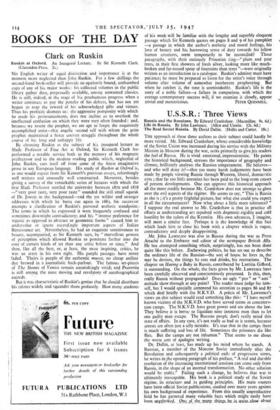BOOKS OF THE DAY
Clark on Ruskin
No English writer of equal distinction and importance is at the moment more neglected than John Ruskin. For a few shillings the second-hand book-seller will provide an opulently bound, unthumbed copy of any of his major works : his collected volumes in the public library gather dust, perpetually available, among unwanted classics. He is still,- indeed, at the stage of his posthumous progress when a writer continues to pay the penalty of his defects, but has not yet begun to reap the reward of his acknowledged gifts and virtues. Thus his prolixity dismays us : the aggressive pomposity with which he made his pronouncements does not incline us to overlook the intellectual confusion on which they were very often founded : and, because we resent the prophet, we are apt to forget the exquisitely accomplished artist—that angelic second self with whom the grim prophet maintained a fierce uneven struggle throughout the whole course of his long and unhappy life.
By choosing Ruskin as the subject of his inaugural lecture as Slade Professor of Fine Art at Oxford, Sir Kenneth Clark has performed a notable service both to the memory of his magnetic predecessor and to the modern reading public which, neglectful of John Ruskin, cuts itself off from some of the finest imaginative prose in any European language. His study of Ruskin at Oxford is, as one would expect from Sir Kenneth's previous essays, refreshingly well written and unusually well constructed. Moreover, besides giving a survey of the remarkable series of lectures with which the first Slade Professor startled the university between .1870 and 1878 —" very poor taste, very poor taste " sounded the still small squeak of Dr. Jowett in the background—and the yet wilder and stranger addresses with which he burst out again in 1883, his successor attempts a clarification of Ruskin's personal aesthetic standpoint.. The terms in which he expressed it were frequently confused and sometimes downright contradictory; and his " intense preference for )rganic as opposed to abstract or geometric forms " caused him to undervalue or ignore exceedingly important aspects of Italian Renaissance art. Nevertheless, he had an exquisite sensitiveness to beauty, accompanied, as Sir Kenneth says, by " marvellous powers of perception which allowed Ruskin to penetrate farther into the core of certain kinds of art than any critic before or since." And then, like. all the best, Or, at least, the most inspiring, critics, he Was an artist in his own right. His purple passages have never faded. Theirs is purple of the authentic murex, no cheap aniline dye brewed in a journalistic back-parlout. The fatuous set-pieces of The Stones of Venice remain astonishingly vivid; and Praterita is Still among the most moving and revelatory of autobiographical records. •
But it was characteristic of Ruskin's genius that he should distribute his talents widely and squander them profusely. How many students
of his work will be familiar with the lengthy and superbly eloquent passage which Sir Kenneth quotes on pages 8 and 9 of his pamphlet —a passage in which the author's aesthetic and moral feelings, his love of beauty and his harrowing sense of duty towards his fellow human creatures, seem temporarily to be reconciled? These paragraphs, with their curiously Proustian ring—" plum and pear trees, in their first showers of fresh silver, looking more -like much; broken and far-tossed spray of fountains than trees "—were originally written as an introduction to a catalogue. Ruskin's admirer must have patience; he must be prepared to listen for the artist's voice through volume after volume of somewhat incoherent prophesying. But when he catches it, the tone is unmistakable. Ruskin's life is the story of a noble failure—a failure in comparison with which the average contemporary success will, if we examine it closely, appear


































 Previous page
Previous page